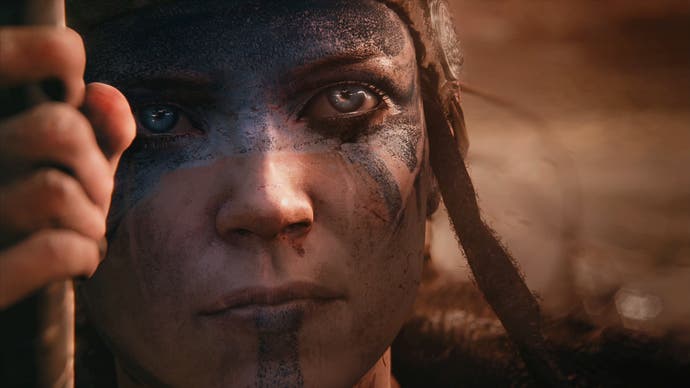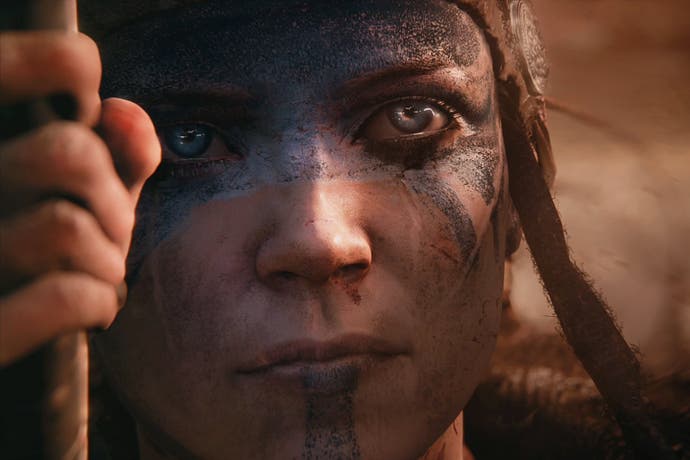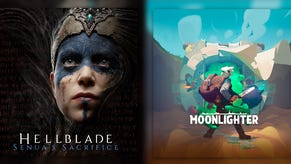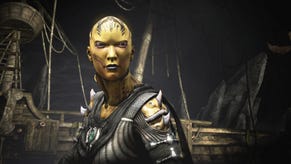Ninja Theory: Don't call Hellblade Heavenly Sword 2
It's got nothing to do with it, but¡
Last week UK developer Ninja Theory unveiled its new game, Hellblade, during Sony's press conference.
It did so with a trailer that showed off a character that reminded some of one of Ninja Theory's old games: Heavenly Sword.
Heavenly Sword is a 2007 PlayStation 3 exclusive developed by Ninja Theory. It stars Nariko, who wields the Heavenly Sword to defeat her enemies in brutal melee combat.
Seven years later we have Hellblade, a game currently being developed just for PlayStation 4 by Ninja Theory. It stars Senua, who wields the Hellblade to defeat her enemies in brutal melee combat.
Drawing a line between Heavenly Sword and Hellblade is an obvious and easy thing to do. And, let's be honest, Ninja Theory asked for it. At first glance Senua looks like she might be Nariko or her adopted sister Kai. And just look at the name of the games: Heavenly/Hell. Sword/Blade.
So, as we sit down with "production development ninja" Dominic Matthews for a chat about the game, drawing that line seems like an obvious place to start: is Hellblade in any way tied to Heavenly Sword?
"No, it's not," he says. "It's a brand new IP. Senua is a new character. It's not tied to Heavenly Sword at all.
"I saw someone describe the name as someone just putting Heavenly Sword into Thesaurus.com and going, oh it's Hellblade. It's not something where we've gone, yeah, let's make people think it is this. We really like Heavenly Sword. We loved making that game. So it's actually more just we like making female protagonists that look in a certain style. And we like swords. And we like hell. It's more that.
"I know it might appear like we've just gone, let's just stick it in a thesaurus..."
It sure does, but on one hand you can't blame Ninja Theory for trading off of Heavenly Sword, which, despite failing to set tills alight (this was in part to do with the PS3's tough start), enjoyed a positive reception. You still see calls for a sequel pop up every now and then. And if you're going to rekindle memories of Heavenly Sword, now seems like a good time to do it; a CG-animated film version is in production, although it doesn't look... great.
A spiritual successor, then? Nope. Not even a spiritual successor, Matthews says.
"No. I wouldn't say it's the spiritual successor to Heavenly Sword, because that has certain expectations. I think it's safer to say if people enjoyed Heavenly Sword, then the aim is they'll enjoy Hellblade, too. If we said it was the spiritual successor, there would be an expectation there is a story link or a certain type of gameplay or level design. It's a new IP. It's a brand new game. It's brand new characters. It's a brand new world. It's not linked at all. But if you like Heavenly Sword, like Enslaved and like what we did, then the aim is you'll like this, too."
We don't know much about Hellblade at this stage, which makes sense, given Ninja Theory has only been working on it for four months. But what we do know suggests a game very much in keeping with what the developer is known for: brutal melee combat, lots of story and fancy cutscenes, and eye-catching art design. Hellblade is based on Celtic myth, and Senua is a warrior of the time. The game and its story revolves around her personal journey, and, as you've probably worked out already, her battle against hell. That's about all we have for the set up.
We know more about the way Ninja Theory will make Hellblade than the game itself. The studio is taking a different approach than it did with Heavenly Sword for Sony, Enslaved for Bandai Namco and Devil May Cry DmC for Capcom. For one, Ninja Theory will publish the game itself. Two, it seems like a smaller scale project, at least in terms of size and scope, although the developer promises to match the slick visuals of its previous games. And three, it's a download game, so you won't find it in shops.
"It's our first independent self-published game," Matthews says. "We're still striving for super high production values, but in a shorter, lower-priced, digital experience. For us it's trying to take that middle ground between indie titles and big, triple-A titles, and delivering something that is the quality of the big triple-A, but is more in the spirit of indie titles. It's something we can create that's for our fans, really. We think we know what our fans like, which is our stories, characters, art and combat. We want to create something that's just for them."
Ninja Theory's hand may have been forced here. The studio went dark after the release of DmC in January 2013. Then, at GDC Europe last week, design chief Tameem Antoniades revealed the studio had worked on a number of failed follow-ups, including the intriguing Razer. Publishers weren't interested and that, it seems, is because the audience for the kind of games Ninja Theory specialises in - melee combat games such as Devil May Cry - isn't as big as it once was.
"The market for triple-A, $60 games now, there's just such a huge pressure to deliver a massive product that ticks so many boxes," Matthews laments. "And for us as a developer of 100 people in a studio that makes melee combat games, it's very difficult to get those types of games signed because the pressure is to sell so many millions of units.
"A game like DmC or some of the stuff Platinum Games is doing, they can be the most amazing games in the world, but it's going to be very difficult to sell those types of games to the numbers of people who are buying Call of Duty and Assassin's Creed."
Ninja Theory's answer is what it's calling independent triple-A. Hellblade isn't a triple-A game in same vein as its previous games. Nor is it what we think of as an indie game (a term that seems in 2014 to be as useful as a, well, triple-A melee combat game). It's cheaper to make, quicker to produce and, as a result, it doesn't need to sell as many copies to prove a success. And, of course, digital distribution provides an avenue through which Ninja Theory can itself publish Hellblade.
"The great thing is we find ourselves in a situation where digital distribution and self-publishing allows us to make something where we don't have to pretend it's for a massive audience," Matthews says. "This is something for people who like combat games, story games and like what we do."

Ninja Theory intends to open up the development of Hellblade to involve the gaming community more so than it did with its previous games. To this end Ninja Theory will release development diaries and documentation in a bid to get gamers more interested in the game. "We wanted to announce it early so we can take people through development as we go through it," Matthews says.
Yes, that announcement. Hellblade was revealed during Sony's Gamescom press conference as "first to console on PS4". It's self-published and Ninja Theory retains the rights to the game, so you'd expect Hellblade to come out on PC and possibly even Xbox One at some point, but all Matthews will say is it's currently being developed only for PS4, and sticks to Sony's message of "first to console on PS4".
"Sony have offered us a great platform to announce the game," he says. "The big thing for us is we wanted to get something out there. We've been quite quiet for a while because we've had stuff that's not worked out for us. We've been pretty honest about that. We've concepted games that have not been greenlit.
"We've gone deep into Hellblade, put together a trailer that we wanted to wow people with. Gamescom and Sony's press conference is a great stage to get it out to people. The reaction has been awesome."
To you and me and most other right-thinking people it's easy to think of Hellblade as Heavenly Sword 2, despite what Ninja Theory says. But Matthews is right in warning us off doing so, because the way the game is being developed and the way it will be released is significantly different than what's gone before. Hellblade is smaller and shorter than Heavenly Sword and its development is more agile and more transparent. But at the end of the day, when we're all slicing and dicing the horrors of hell, it'll probably feel a lot like it.










